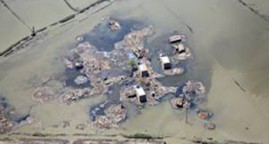World Disasters Report 2015
Focus on local actors; the key to humanitarian effectiveness
Local actors are often the most effective in conducting humanitarian operations. However, despite their critical role, they struggle to attract the funding and support they need.
The 2015 World Disasters Report – launched today by the International Federation of Red Cross and Red Crescent Societies (IFRC) – examines the complexities and challenges local actors face in scalingup and sustaining their humanitarian response.
Although widely recognized, the effectiveness of local or national humanitarian organizations is not reflected in humanitarian financing or coordination structures. The Report found, for example, that just 1.6 per cent of funding for humanitarian assistance is channeled directly to national and local NGOs. It presents the case for a shift towards the “localization” of aid and a more equal partnerships between international and local actors.
“Local actors are always the first to respond. In 2015, we saw local people and organizations at the centre of operations rescuing thousands trapped in the rubble after the earthquake in Nepal, setting up evacuation centres in the wake of Cyclone Pam in Vanuatu, and on the frontline of the protracted conflict in Syria,” said Elhadj As Sy, the Secretary General of the IFRC.
“But their effectiveness goes beyond their proximity. Local groups, including National Red Cross and Red Crescent Societies, are effective because of the perspective they bring, their understanding of language and cultural norms, and because they are permanently present in communities and able to
accompany them to address risks before disaster strikes.”
Read the article on the IFRC website
Related Articles
AB Gallagher on Holy See’s action to protect Christians and other minorities
05/22/2017. The Holy See’s ‘foreign minister’, Archbishop Paul Gallagher full statement
Agriculture pays the highest price to disasters, according to a new FAO report
03/19/2015. According to a new FAO report nearly a quarter of the damage caused by natural disasters in the developing world are borne by the agricultural sector.
INTERVIEW: ‘Our peacekeepers are saving lives every day’ – new UN peacekeeping chief
05/22/2015. More than 3,500 peacekeepers who have lost their lives in the service of peace since UN deployments began in 1948.






